Two Months to Europe's Suicide
Adelina Marini, January 22, 2016
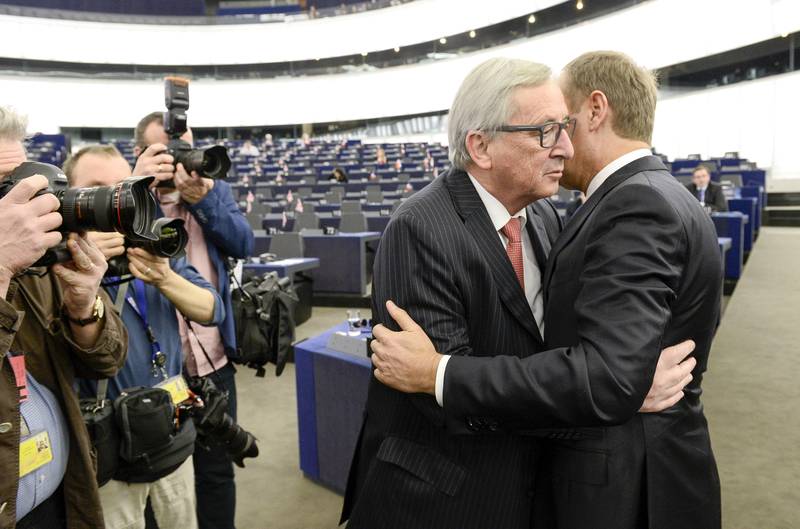 Up until a year ago it was taboo to even think it was possible that a country should leave the euro area, while in the last week alone so much was said about a possible death of the European Union that there is even an exact date set. The Union has two more months to live. The final countdown was started by European Council President Donald Tusk during one of the saddest, most depressing debates in the European Parliament. On January 19th, he and European Commission President Jean-Claude Juncker were reporting to MEPs on the results of the December summit – one more meeting to try and find a solution to the refugee crisis, but it played down to mainly reminding member states of their made and as of yet not implemented commitments. Moods in the EU are worsening by the day and there is no light in the tunnel visible yet.
Up until a year ago it was taboo to even think it was possible that a country should leave the euro area, while in the last week alone so much was said about a possible death of the European Union that there is even an exact date set. The Union has two more months to live. The final countdown was started by European Council President Donald Tusk during one of the saddest, most depressing debates in the European Parliament. On January 19th, he and European Commission President Jean-Claude Juncker were reporting to MEPs on the results of the December summit – one more meeting to try and find a solution to the refugee crisis, but it played down to mainly reminding member states of their made and as of yet not implemented commitments. Moods in the EU are worsening by the day and there is no light in the tunnel visible yet.
“The March European Council will be the last moment to see if our strategy works. If it doesn't, we will face grave consequences such as the collapse of Schengen”, said Mr Tusk to MEPs after explaining that the migrant crisis was an existential challenge to the EU. “Our community is experiencing a stress test”, he added and swore that his main goal in 2016 would be preserving European unity. Despite his speech being utterly depressing and discouraging, he spoke against any “alarmist rhetoric on the future of Europe” and pleaded that the issue be approached neither with naivety nor with pessimism, but with realism. He finished with a quote by the famous British historian Arnold Toynbee that civilisations die of suicide, not by murder.
The words of European political scene veteran Jean-Claude Juncker (Luxembourg, EPP) were not less pessimistic. They sounded even more frustrating to that part of the European Union which is neither in the euro area, nor in Schengen, because Mr Juncker repeated his idea which makes it out as if the EU is Schengen. Both he and President Tusk sent heavy criticism in towards member states for undermining the Union themselves. The former Polish prime minister literally gave up on his subordinates by stating that never so far had a compromise in the European Council been easier, simply because the very next day what was agreed is not implemented. “Today it's really difficult to discipline the member states. Neither I do have tanks, nor does the Commission”, said Tusk and later excused himself for the “brutal joke”. This, however, was no joke and the line was totally inappropriate, for making such jokes, which bring back bitter memories of the Prague spring and the Soviet tanks entering Budapest, at a moment when Euroscepticism is on a high rise again, shows the helplessness and cluelessness that European institutions and their leaders are in, totally dismissed by the ones that created them – the member states.
It's the implementation, stupid!
European depression hung heavy over the World Economic Forum in Davos, where the future of Europe was the subject of a separate panel with the participation of the prime ministers of France, The Netherlands, Greece, and Germany Finance Minister Wolfgang Schäuble. Right from the start of the discussion the question of not just the future of Europe, but what the participants’ vision on Europe’s future was was put forward. The answer came from the influential German minister. Strong institutions are needed. Otherwise agreements will be needed, he said and announced that he supported stronger institutions. The problem is the implementation. “If we want to make Europe stronger, then we should implement what we agreed to implement. We could just say 'Implementation, stupid!'”, he finished, paraphrasing the famous line “It's the economy, stupid!”.
French Prime Minister Manuel Valls announced that more Europe was needed and his Greek colleague Alexis Tsipras agreed. Once again it became evident, however, how different their understanding is of what it means to have more Europe. To Dutch PM Mark Rutte it means completing the common market, for at the moment just 45% of the European economy is part of the common market. The EU is practically absent from the digital sphere, the area of services, energy. But when these issues were raised the French PM complained that they were jumping too fast from the issues of terrorism and security into other subjects. According to Mark Rutte, it is important not just to 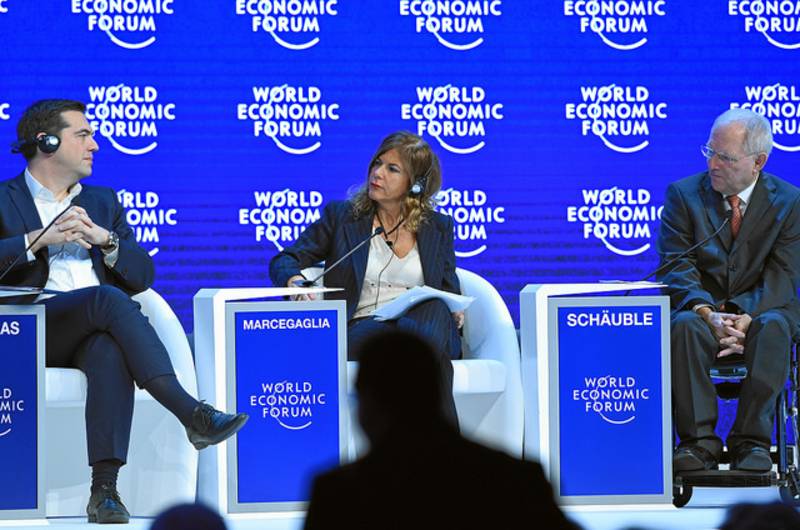 think about the problems at hand, but also about those things that would actually be beneficial to everyone in the EU.
think about the problems at hand, but also about those things that would actually be beneficial to everyone in the EU.
Just a day earlier, again in Davos, German Vice Chancellor Sigmar Gabriel stated fully honestly that he did not believe that a European agreement on the refugees was possible. “I do not see any willingness in the majority of member states”, he said. There is neither the time, nor the possibility to persuade the Polish government or the others who are resisting, continued the Vice Chancellor during a panel with the participation of the prime ministers of Serbia and Sweden on the topic of migrant integration. During the debate in Strasbourg on Tuesday MEPs sent sharp criticism towards the member states, but already the voices of exhaustion are being heard.
Many agreed with Spanish MEP Enrique Guerrero Salom (Socialists and Democrats) that Europe at the moment is like the myth about Sisyphus – if one is to look at the conclusions of the summits from June, October, the emergency and informal meetings in September and November, he would see that the conclusions are not identical. This means that the same process is turned over again and again – the Council prepares and proposes, decisions are made, and then member states go back to their capitals and just disregard or do not implement certain decisions. “The myth of Sisyphus, we're condemned to go back again and again to the starting point. The moral climate and also the enthusiasm is dropping”, concluded the Spanish MEP.
The always passionate and full of ideas former PM of Belgium, now leader of the group of Liberals in the EP Guy Verhofstadt sounded even more despairing. “I really hesitated to participate in this debate. We repeat ourselves time and again”, he said. In the meantime, borders keep returning and nobody seems to notice. During the New Year’s press conference the president of the EC, Jean-Claude Juncker, announced the price of this return. The cost of border control just on the Öresund Bridge, connecting Sweden and Denmark, has already reached 300 million euro. 19 million people regularly pass EU borders. In Europe, there are 47 million fright transport passes annually, which means every hour spent at the border means 55 thousand euro per truck. He forecasted that the price of border control could reach three billion euro. He swore that he would not let member states do as they please. “If all of this is to collapse, there will be an immeasurable damage to the economy”, concluded the EC president at the end of last week.
Dutch PM Mark Rutte, whose country took over the presidency of the Union on January 1st, agreed with Donald Tusk that the Union had 6 to 8 weeks left. He warned, however, that before Schengen is murdered the Dublin regulation must be made work. Many in the EU, including German Chancellor Angela Merkel, are of the opinion that Dublin is long dead. At the background of the devastated and worried faces of the European leaders and pro-European politicians, the Eurosceptics rejoiced this week in the European Parliament. British MEP Gerard Batten from the group of Europe for Freedom and Direct Democracy (UKIP) even invited Guy Verhofstadt to participate in the campaign for the referendum for Great Britain’s membership in the EU, for he thinks that the pro-Europeans’ arguments could dissuade many more Brits that there are benefits from their EU membership. And the former Rapporteur on Bulgaria in the EP, Geoffrey Van Orden (ECR), sounded no different than Nigel Farage in his words that the EU is fully occupied with looking for a role for itself 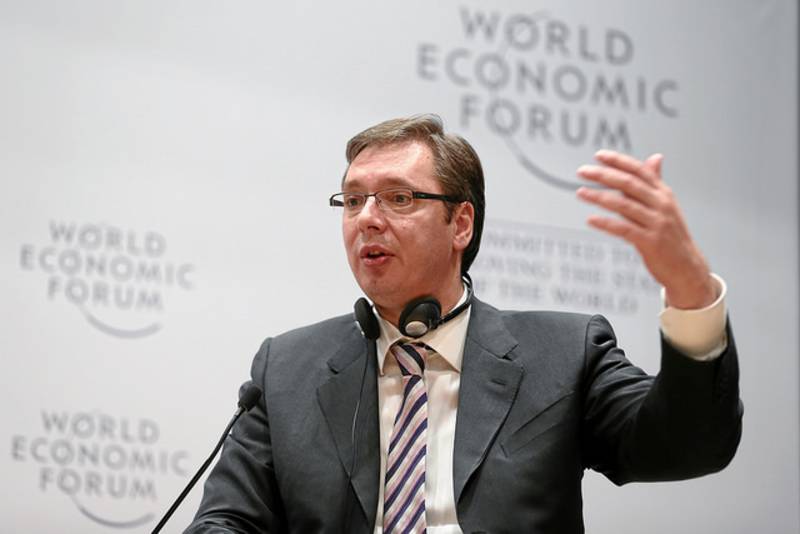 and protecting its institutions. “Many of the problems are consequences of the EU's own policies”, he said.
and protecting its institutions. “Many of the problems are consequences of the EU's own policies”, he said.
More salt into the wound rubbed Serbian PM Aleksandar Vučić, whose country officially started membership negotiations with the EU in December, by saying that he does not believe that the common protection of European borders will work out. Nothing can be done in Greece either, he said, adding more pessimism fuel to fire. Guy Verhofstadt urged Donald Tusk to immediately call another emergency summit on the refugees subject until this issue is dealt with. The problem with Britain’s demands could wait until March or April. “I think the most urgent thing to tackle now is to make the member states act. That seems to me far more important than starting the whole discussion of a Brexit. Because it could be that you find maybe a way out for the Brexit and it remains in the EU, but it could be we find ourselves without a EU if we continue like that.”
Bulgarian MEP Maria Gabriel (EPP) was one of the rare optimists in Strasbourg this week. In an interview for euinside she stated that she believed in the capability of the EU to transform difficulties into possibilities. She feels, however, that with a union of 28 members it is not always prudent to look for unanimity. Unanimity was adequate with five, or even 11 members. Qualified majority is better suiting with 28 members and, in her words, it is fair enough. “In this situation, I feel we also need to have the courage to talk about the fact that when such important issues are concerned it is not normal for a single state, or a couple of states to be able to impede the other’s to go forward”, she added. (You can see the full interview in the attached video file).
“Man achieves civilisation, not as a result of superior biological endowment or geographical environment, but as a response to a challenge in a situation of special difficulty which rouses him to make a hitherto unprecedented effort”, explains Toynbee in his “A Study of History”. “EU is based on the assumption all member states are ready to act with good will and especially that they are ready to respect our common decisions. Without this determination our work doesn’t make sense“, were the words of European Council President Donald Tusk to MEPs. And only days ago the European elite pleaded that there was no need of over-dramatisation. As Ron Weasley says in “Harry Potter and the philosopher’s stone”, “can we panic now?”
Translated by Stanimir Stoev
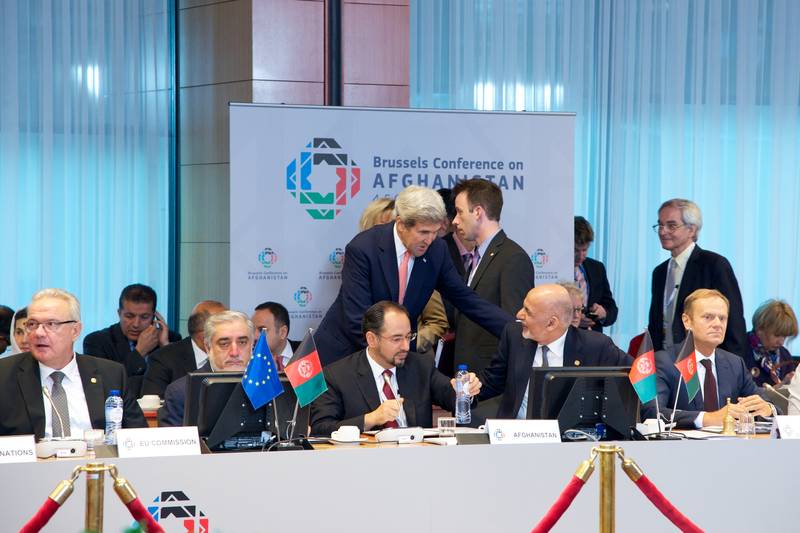 | © Council of the EU
| © Council of the EU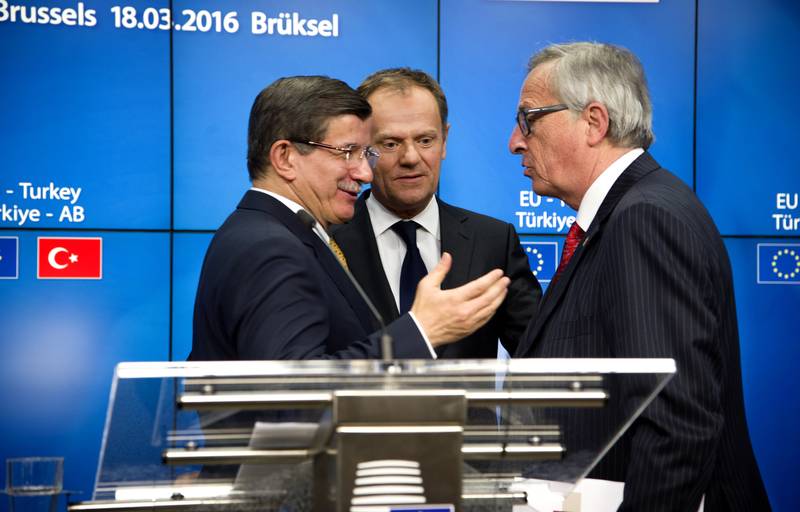 Davutoglu, Tusk, Juncker | © Council of the EU
Davutoglu, Tusk, Juncker | © Council of the EU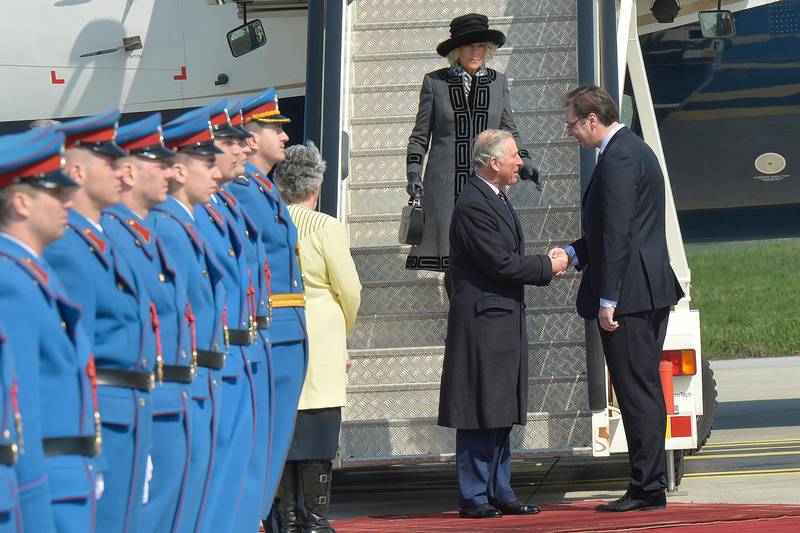 | © Vlada RS
| © Vlada RS